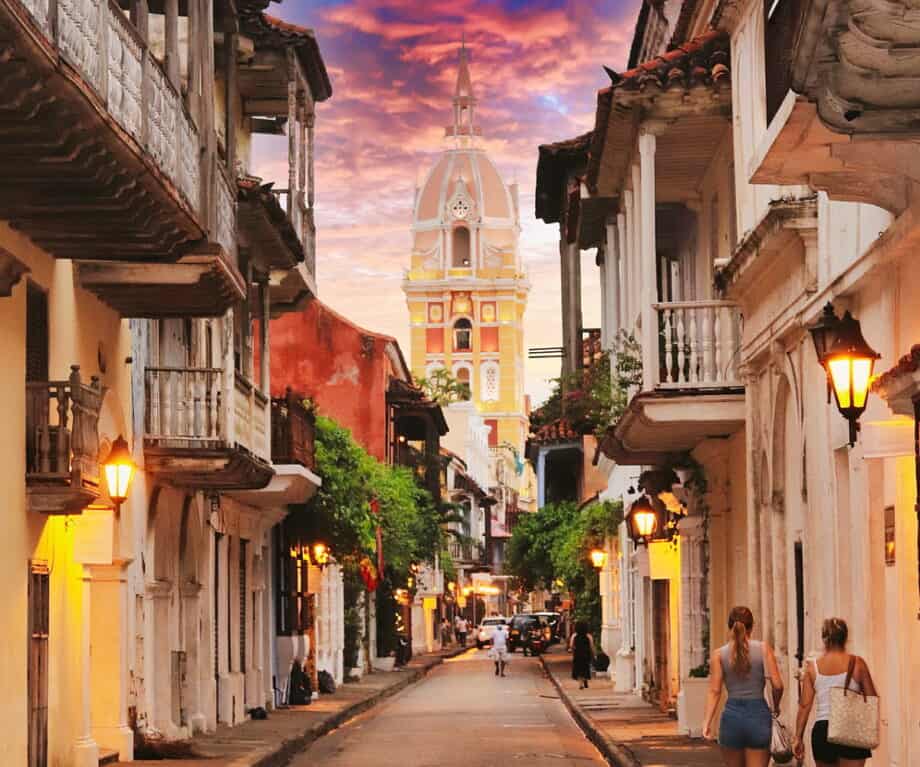A vibrant city on Colombia’s Caribbean coast, Cartagena is known for its rich cultural heritage, colorful colonial architecture, thumping nightlife, captivating festivals, and dazzling beaches. The sum of these qualities has undoubtedly made the city the most desired destination in Colombia for decades; indeed, it’s an almost mandatory South American travel destination.

To give discerning travelers a rough idea of what they might expect if venturing to Cartagena, we’ve overviewed a handful of the features that make this city so well worth experiencing.
Exploring the Walled City: Lose yourself in the radiant hues of Cartagena’s ‘Old City’ streets
Cartegena’s 500-year-old historic center is where the city’s main attractions are found, where it’s a joy to stroll safely along its cobblestone streets. The district is surrounded by seven miles of thick coral walls that once safeguarded the city from plundering pirates. For this reason, the district is called “the Walled City;” moreover, this historic district was declared a UNESCO World Heritage Site for being an authentic colonial jewel.

While exploring the Walled City area, don’t miss out on visiting the lively and captivating streets of its two especially vibrant neighborhoods: Centro and Getsemani, which are best explored on foot.
With their colorful streets, mesmerizing murals, kaleidoscopic art galleries, charming cafes, and vibrant nightlife, let these historical districts transport you to another era. These features make these quarters paramount in experiencing Cartagena’s rich history and local color.
The city’s nightlife: Step into a world of nocturnal delights
When the sun goes down over the Caribbean Sea, the age-old streets of Cartagena spring to life. The music, salsa, and entertainment explode. As you explore the walled city of the city’s historic center, you’ll find this an area that seems to never sleep. On any evening of the week, the city’s nightlife is buzzing and eclectic – both for those visitors anxious to party all night and those seeking a more refined and relaxed evening.

For dancing, Colombians have embraced salsa with a passion, so people wanting to bust out their moves will love the central neighborhood of Getsemani, which is packed with salsa clubs and late-night partying.
The upscale Café Havana and the Quebra-Canto are the only salsa clubs with live music to which you can dance to Colombia’s most famous rhythms. Whether you’re an experienced salsero or taking your first steps, these clubs radiate friendly vibes where everyone is encouraged to join in on the fun. Dancing to the rhythm of the night, you’ll find the emotion and enjoyment of the people of Cartagena contagious.

For a more relaxed tropical evening, it’s off to chic spots like Café del Mar or Movich Cartagena with a cocktail in hand. Gloriously atmospheric and giving off more laid-back vibes, you can take in Cartagena’s sweeping skyline from venues perched above the city’s age-old perimeter walls.
In short, Cartagena’s nightlife scene is as lively and colorful as the city itself, with countless options to suit just about anyone’s tastes. From chilled-out evenings to full-on salsa clubs, there’s something for everyone in this 24/7 city.
Luxury accommodations: Hidden gems along the shoreline
Planted within Cartagena’s historic center, elegant hotels such as Casona del Porvenir, Sofitel Legend Santa Clara, Casa San Agustín, Hotel Charleston Santa Teresa, and a handful of others serve as convenient and lavish bases for exploring the walled city’s shops, heritage sites, restaurants, and buzzing clubs and bars.

Behind their perfectly preserved 17th and 18th-century façades, smart and sophisticated interiors reveal themselves enhanced by restored features. Still, you’ll find original frescoes along with wooden beamed ceilings, exposed brickwork, arched windows, and covered balconies. Historical architecture is seamlessly integrated with contemporary luxury, as can be seen in each of these hotels’ individually designed guest rooms and suites.
These five-star accommodations effortlessly mix traditional colonial architecture with modern, clean lines subtly illuminated by atmospheric lighting. The results are warm and inviting. Some suites overlook lush hotel courtyards, while other rooms have sweeping views of Old and New Town.

Equally welcoming in luxury Cartagena accommodations are stylish restaurant bars with inventive menus influenced by flavors of the tropics and traditional Colombian fare. Tantalizing local and international fare may be enjoyed not only in the gourmet hotel restaurants themselves but also in these hotels’ elegant bars, lounges, gardens, or terraces as well.
The tropics are also the inspiration for various signature drinks served at swank bars, which may be supped on rooftop lounges overlooking the streets and squares. Should you wish to take a refreshing dip to cool off from the sultry Caribbean heat, all the top-notch hotels have at least one fully complemented pool area and blissful jacuzzies.
Each of Cartagena’s luxury hotels offers a unique blend of historical charm, exceptional service, and modern amenities, providing an exquisite and memorable stay for discriminating travelers.
Everything you need to plan your trip in 2024
Cartagena dining: Embark on a culinary odyssey
A coastal Colombian gem, Cartagena is proud of its kaleidoscopic culinary scene. Its exciting and wildly diverse gastronomic options span the gamut from chic upscale dining that artfully fuses local flavors with international trends, to simple street food stalls that reflect a rich cultural heritage and Caribbean charm.

Seafood is almost a given, thanks to Cartagena’s location on the Caribbean coast. Dishes featuring fresh, flavorful, local ingredients are prepared with care. Be sure to sample the ceviche (typically made of a refreshing mix of fresh raw fish cured in citrus juices), pargo frito (fried red snapper), and arroz con coco (coconut rice). You’ll be sure to want to come back for more.
All these dishes can be sampled in the heart of Cartagena’s Centro quarter, where you’ll want to put the Marisquería La Marina restaurant on your fine dining itinerary, especially if seafood dishes are your thing. Then too, you can visit the elegant La Marquesita and Magoga, two refined restaurants recommended by Michelin.

Alongside haute cuisine, the city has a diverse assortment of quick bites that can be (carefully) gotten from street vendors. On practically every street corner and plaza, their tempting aromas lure passers who are served meals hot off the grill, out of the fryer, or straight from a bubbling pot.
But remember, dining in Cartagena is not just about the food; it’s also an experience. Many restaurants offer open-air seating with views of the historic cityscape or the sea, which can enhance an already stunning dining event. The combination of traditional flavors, fresh ingredients, and scenic settings make eating in Cartagena an unforgettable part of any visit.
Cartagena’s beaches: Unplug, unwind and recharge
Cartagena is a picturesque coastal city dripping with flamboyant tropical flair. Its gorgeous coastline possesses a host of beaches that cater to any type of traveler. The truth is that beaches surround almost the entire city, each with something different to offer. Though some are even more attractive than others, each beach along the city’s shore is a convenient choice within easy reach.

The most popular and accessible is Bocagrande Beach. Close to the city center, it’s a large beach lined with high-rise hotels, shops, and plenty to see and do. It’s the best beach in terms of not only ease and convenience, but also in the availability of water sports and other beach activities – perfect for energetic travelers!
Still, even nicer beaches are found outside the city. The main and best area beaches are found on the Rosario and Tierra Bomba islands and Barú peninsula. With white sands, palm trees, and cooling sea breezes, as well as coral reefs in some cases, these beaches are where your Caribbean Instagram dreams will come true.
Case in point: Playa Blanca, on the nearby Barú peninsula and where any excursion is unforgettable. The beach is accessible by boat or car and is well known for its powdery white sand and crystal-clear turquoise waters. The beach is great for swimming, snorkeling and just lounging around in the shade of swaying palm trees. Though it and other beaches are a bit further out, don’t worry; in these areas, you’ll find a mix of beachside restaurants offering exquisite meals with fresh seafood and tropical drinks.
Afro-Caribbean culture: Take part in the celebration
Recognized as having played a significant part in the transatlantic slave trade, Cartagena is today home to a dynamic African culture. Black Colombians (referred to as Afro-Colombians) have left an indelible mark on the city’s rich tapestry. This legacy is indispensable to popular urban culture, as shown through dance backed by traditional rhythms such as cumbia, mapalé, and champeta, which were born of African rhythms. Palenque drums (originating in nearby San Basilio de Palenque, the first free African town on the continent) are among the most characteristic of Cartagena’s cultural scene.

In Cartagena, African influences abound. For example, one can still encounter the Creole dialect known as Palenquero – a mix of Spanish and African languages. Likewise, African motifs are used in the local arts and crafts, while religious practices in Cartagena reflect a mixture of Catholicism and Afro-spiritual traditions displayed through various rituals and festivities.

Likewise, festivals like the Fiesta de la Independencia and the Afro-Colombian Carnival celebrate African traditions with animated parades, music, dancing, and colorful costumes. African influence is also seen in Cartagena’s cuisine, which includes coconut rice (arroz con coco) and fried plantains, along with the fresh seafood that combines these flavors.
In Cartagena, African cultures have left their mark of strength and creativity upon a city teeming with life that shapes the city’s ever-evolving urban culture – one you can experience firsthand.
San Felipe de Barajas Fortress: The ‘guardian of Cartagena’
A UNESCO-declared World Heritage Site, Cartagena is famous for its incredibly well-preserved fortification and the 400-year-old fortified stone walls surrounding the city. Unquestionably, the Castillo de San Felipe de Barajas is the largest fortress in South America and the most imposing the Spaniards ever built within their colonies.
Even today, sitting high on a hill, this fortress dominates an entire quarter of the cityscape. Quite to the letter, it was impregnable and never stormed, despite repeated attacks by pirates and other enemies.

The fortress’s invincibility was thanks to its intricate systems of tunnels, galleries, and underground passageways, which allowed easy and undetectable movement of troops and supplies. The entire system of tunnels served not only in the distribution of provisions throughout the fort but also ensured that even the slightest sounds of enemies entering the citadel were amplified, as the labyrinthine tunnels were constructed such that any noise would echo completely through them. The fort’s bulky, sloping walls and bastions were designed to deflect cannonballs, and embrasures or gunholes were placed at strategic spots to give wide vistas of anyone approaching by land or sea. As such, San Felipe de Barajas — strategically designed to dominate land- and seascapes and resist sieges — is one of the best examples of Spanish military engineering.

Apart from the fortress itself, the city’s colonial heart is enclosed within seven miles of defensive walls. Like the fort, these were built during Spanish colonial times as an added layer of the city’s security, designed to protect it from pirate attacks and military invasions. Viewing the walls, you’ll undoubtedly appreciate the tenacity and genius of Spanish-colonial-era military architecture, especially the ramparts and the rather intricate moat and gate system. Collectively, these earned Cartagena the name “the Walled City,” a designation that identifies Cartagena for what it possesses: a history of strength and fortifications so remarkable that they remain part of the city’s character to date.
This fortress and the system of walls, with their strategic locations and architectural designs, make Cartagena a must-visit for history lovers and those wishing to virtually travel back in time to experience this chapter in South America’s colonial past.
Colombian coffee: For a flavorsome taste of tradition
While this lively Caribbean city is well known for its magnificent beaches and colonial charm, it also possesses an ever-expanding coffee culture. As Colombia is flush with lush coffee plantations, Cartagena is supplied with rich flavors and traditions that lure coffee lovers from around the planet.

Dotting the city’s historic streets are shops known as cafeterías serving up freshly brewed savory cups to locals and tourists alike in a cozy ambiance. In Cartagena, like in Colombia generally, coffee is more than just a drink – it’s a veritable ceremony. Guaranteeing a fresh and authentic taste, each cup is skillfully prepared by baristas using beans grown in regions such as the country’s famed “Coffee Triangle.” The coffee is often served with local delicacies such as arepas or pandebonos, making the brew’s taste even more unforgettable.

As a visitor to the city, you can dig deeper into the elaborate bean-to-cup process by enjoying a coffee workshop or going on a special coffee tour. Otherwise, you can always choose to sit down to a smooth café con leche or savor a hearty espresso. During a visit to Colombia, it would be utterly sinful not to taste its much-celebrated coffee. Cartagena promises a satisfying destination for an exceptional taza.
Explore, relax and revel in Cartagena’s Caribbean essence
Head to Cartagena for an intoxicating mix of history, culture, and jaw-dropping coastal beauty. The eye-catching beaches of Cartagena, combined with the warm Caribbean seas are perfect both for sublime relaxation and eye-opening adventure.

Then too, the city’s well-preserved colonial architecture, such as the San Felipe fortress and the towering city walls, tell tales of days gone by. Enjoy the bright streets full of life, exuberant galas, romantic horse-drawn carriage rides, and all-night parties. And of course, you can savor the freshest seafood and authentic Colombian coffee.
Thanks to its sheer magnetism, originality, and urgency, you’ll feel the mesmerizing allure of this place called Cartagena.
Did you enjoy this article?
Receive similar content direct to your inbox.
Please enable JavaScript in your browser to submit the form


